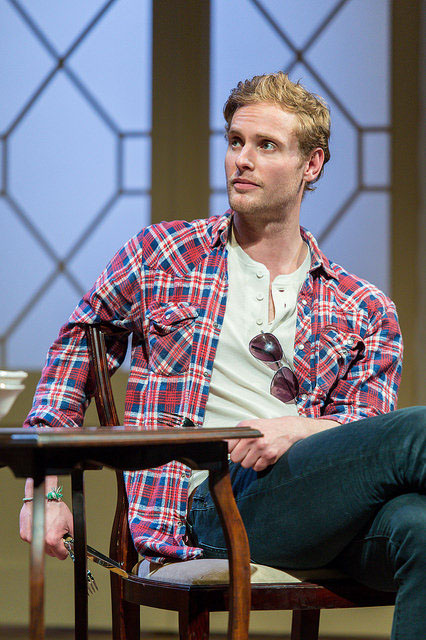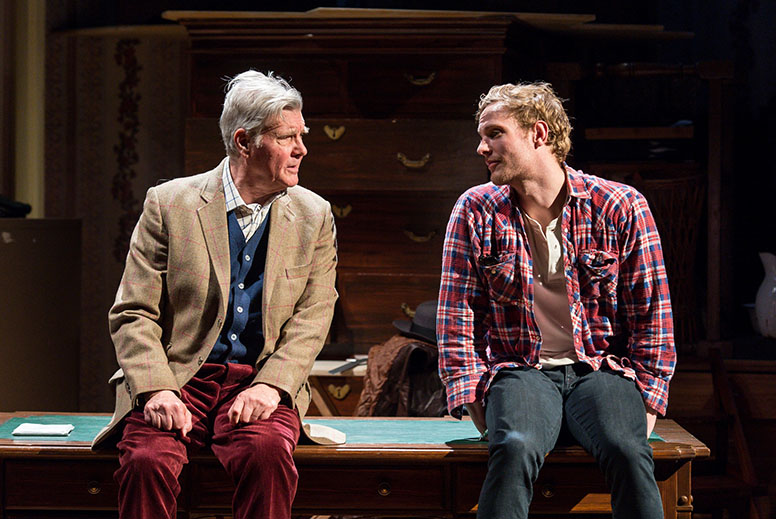Travellers on the London Underground are generally a hardened lot, accustomed to witnessing any number of bizarre sights. But there must have been a few puzzled expressions on the Victoria Line recently when a young man entered a carriage, absorbed in reading a script.
At first he laughed, then he burst into tears. Had his fellow-passengers snuck a glance at his reading material, they would probably have had a similar reaction. You’d have to be a pretty dedicated miserabilist not to find yourself chuckling at the contents of Dear Lupin, the sometime Sunday Times Humour Book of the Year now adapted for the stage by Michael Simkins.
The young man on the Tube was Jack Fox, who plays Charlie Mortimer in Dear Lupin alongside his father, James, at Cambridge Arts Theatre this May. Initially Jack had his doubts about his suitability for the role but he changed his mind in a dramatic fashion.
“I knew that my dad had read the play and liked it very much,” he says. “It was while I was on the escalator in Oxford Circus that I started to read the script, and from the first page I was gripped. It made me laugh and it made me cry. By the time I reached Vauxhall, I was on the phone to my agent.”
Dear Lupin is based on the witty, wise and heartwarming letters written by journalist Roger Mortimer to his unruly son, Charlie. One of the themes of the play is the clash of generations, as Jack explains:
“Roger was born in 1909, so he grew up at a time of war whereas Charlie, born in 1952, was growing up in the 1960s in an atmosphere of hedonism. During the course of the play Charlie discovers that Roger was proud of him, despite his misadventures. The play is about family and about treasuring those bonds. They are the ones who will stick by you: that’s one of the points the play is making.”

How do young Charlie’s deeds compare to his own youthful misdemeanours?
“Like Charlie, I remember behaving like an idiot, and those moments when you worry about the repercussions for your parents of whatever sin it is that you’ve committed. I think that everybody has to learn from their mistakes but they need to be allowed to make them.”
Two-handers like Dear Lupin, apart from requiring a capacious memory from the actor, also depend on a profound trust between the participants. How have the Foxes coped?
“Dad is such a seasoned pro that I’ve learnt a million things from him,” says Jack. “It’s been like having an intensive workshop on working with your Old Man. I haven’t done much theatre, but I discovered that you can really lose yourself in a play and that there’s more of a team spirit than you’ll find on a film set. You get nervous, of course, but you get nervous because you want to be as good as you can be.”
As well as his son’s escapades, Roger has a keen eye for the eccentricities of his friends and neighbours, which he communicates to Charlie in his letters.
“Actors love it when they are given brilliant words to say and we have exactly that in Dear Lupin,” explains James. “Roger is a keen observer of people and their idiosyncrasies and quirks, and he is equally observant about his own foibles and frustrations. It’s a marvellous adaptation by Michael Simkins. He has managed to take something literary, something epistolary and make it into a real theatrical experience without losing anything of the quality of Roger’s writing. He has added a real theatrical dimension to it.”
James concludes: “I think that in Roger we’re putting a gent on stage and gents don’t get much of an airing these days. What he writes is honest and he’s a shrewd social satirist. He’s authentic, almost aristocratic, even a bit raffish and very good company.”
Dear Lupin is at the Cambridge Arts Theatre, 4-9 May, 7.45pm (2.30pm Thur & Sat matinee). Tickets from £15.

